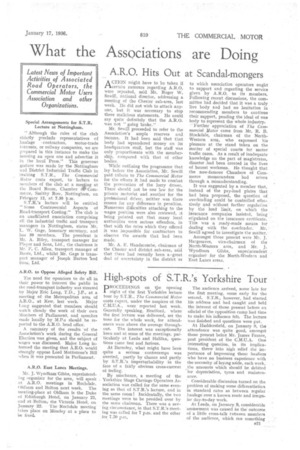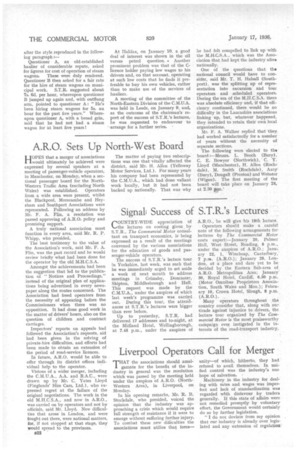High-spots of S.T.R.'s Yorkshire Tour P ROCEEDINGS on tim opening night
Page 35

Page 36

If you've noticed an error in this article please click here to report it so we can fix it.
of the first Yorkshire lecture tour by S.T.R., The Commercial Motor costs expert, under the auspices of the C.M.U.A., were reported last week. Generally speaking, Bradford, where the first lecture was delivered, set the tone for the whole week, for attendances Were above the average throughout. The interest was exceptionally keen and at some of the meetings, particularly at Leeds and Halifax, questions came fast and furious.
At Barnsley, what might have been quite a serious contretemps was averted, . partly by chance and partly by S.T.R.'s imperturbability in the face of a fairly obvious cross-current of feeling.
By mischance, a meeting of the Yorkshire Stage Carriage Operators Association was called for the same evening as that of S.T.R.'s lecture, and in the same room! Incidentally, the two meetings were to be presided over by the same chairman. There was a saving circumstance, in that S.T.R.'s meeting was called for 7 p.m. and the other for 7.30 p.m. The audience . arrived, some late for the first meeting, some early for the second. S.T.R., however, had started his address and had caught and held the interest of those present before an official of the opposition camp had time to make his influence felt. The lecture was finished and questions were put.
At Huddersfield, on January 8, the attendance was quite good, amongst those present being Mr. James France, past president of the C.M.U.A. One interesting question, in its implications, threw into high relief .the importance of impressing those hauliers who have no business experience with the necessity of laying aside, each week, the amounts which should be debited For depreciation, tyres and maintenance.
Considerable discussion turned on the problem of making some differentiation in standard rates as between regular haulage over a known route and irregular day-to-day work.
At Leeds, on January,9, considerable 'amusement was caused as the' outcome of a little cross-talk between members of the audience, which ran something
after the style reproduced in the following paragraph:—
Questioner A, an old-established haulier of considerable repute, asked for figures for cost of operation of steam wagons. These were duly rendered. Questioner B then asked for a fair rate for the hire of steam wagons on municipal work. S.T.R. suggested about 7s. 6d. per hour, whereupon questioner B jumped up again and, with outflung arm, pointed to questioner A: "He's been hiring steam wagons for 5s. an hour for the past five years." Whereupon questioner A, with a broad grin, said that he had not had a steam wagon for at least five years At Halifax, on January 10, a good deal of interest was shown in the oil versus petrol question. Another prominent problem was that of the Clicence holder paying low wages to his drivers and, on that account, operating at such low costs that he finds it preferable to buy his own vehicles, -rather than to make use of the services of hauliers.
A meeting of the committee of the North-Eastern Division of the C.M.U.A. was held in Leeds, on January 9, and, as the outcome of the chairman's report of the success of S.T.R.'s lectures, he was requested to endeavour to arrange for a further series. he had felt compelled to link up with the M.H.C.S.A., which was the Association that had kept the industry alive nationally.
One of the questions that the national council would have to consider, said Mr. T. H. Halsall (Southport), was the splitting up of representation into excursion and tour operators and scheduled operators. During the era of the M.H.C.S.A. there was absolute efficiency and, if that efficiency continued, there would be no difficulty in the Lancashire associations linking up, but, whatever happened. they intended to retain their own local organizations.
Mr. F. A. Walker replied that they had worked satisfactorily for a number of years without the necessity of separate sections.
The following were elected to the board :—Messrs. L. Beech (Bury), C. E. Bowyer (Northwich), C. Y. Lloyd (Manchester), H. Allen (Rochdale), M. Smith (Rochdale), Auty (Bury), Dougall (Preston) and Webster (Wigan). The first meeting of the board will take place on January 24, at 2.30 pan.'




























































































